Here’s my list of recommended Broadway, off-Broadway, and out-of-town shows, updated weekly. In all cases, I gave these shows favorable reviews (if sometimes qualifiedly so) in The Wall Street Journal when they opened. For more information, click on the title.
BROADWAY:
• An American in Paris (musical, G, too complex for small children, reviewed here)
• The Color Purple (musical, PG-13, most performances sold out last week, reviewed here)
• Eclipsed (drama, PG-13, Broadway remounting of off-Broadway production, closes June 19, original production reviewed here)
• Fun Home (serious musical, PG-13, nearly all performances sold out last week, reviewed here)
• Hamilton (musical, PG-13, Broadway transfer of off-Broadway production, all performances sold out last week, reviewed here)
• The King and I (musical, G, perfect for children with well-developed attention spans, virtually all performances sold out last week, reviewed here)
• Matilda (musical, G, virtually all performances sold out last week, reviewed here)
• Les Misérables (musical, G, too long and complicated for young children, nearly all performances sold out last week, closes Sept. 4, reviewed here)
• On Your Feet! (jukebox musical, G, reviewed here)
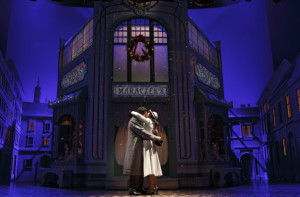 • She Loves Me (musical, G, suitable for bright children capable of enjoying a love story, nearly all performances sold out last week, closes June 12, reviewed here)
• She Loves Me (musical, G, suitable for bright children capable of enjoying a love story, nearly all performances sold out last week, closes June 12, reviewed here)
OFF BROADWAY:
• The Fantasticks (musical, G, suitable for children capable of enjoying a love story, reviewed here)
CLOSING SOON OFF BROADWAY:
• Hold On to Me Darling (drama, PG-13, closes April 17, reviewed here)
• Sense & Sensibility (serious romantic comedy, G, remounting of 2014 off-Broadway production, closes April 17, then reopens June 17-Oct. 2, original production reviewed here)
CLOSING NEXT WEEK IN SARASOTA, FLA.:
• Ah, Wilderness! (comedy, PG-13, closes April 10, reviewed here)
CLOSING SATURDAY OFF BROADWAY:
• Widowers’ Houses (serious comedy, G, too complicated for children, reviewed here)



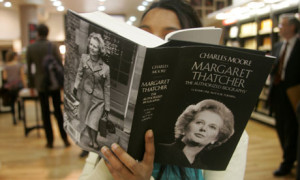 I recently finished reading the
I recently finished reading the 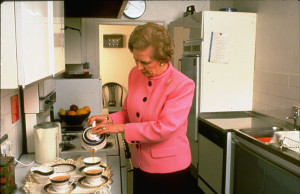 I found especially fascinating the chapter of the first volume in which Moore describes in detail the simple manner in which Thatcher and her family lived in the upstairs apartment of 10 Downing Street. Not being a Brit, it was all news to me, and it says much about her deep middle-class roots, of which she was not even slightly ashamed:
I found especially fascinating the chapter of the first volume in which Moore describes in detail the simple manner in which Thatcher and her family lived in the upstairs apartment of 10 Downing Street. Not being a Brit, it was all news to me, and it says much about her deep middle-class roots, of which she was not even slightly ashamed: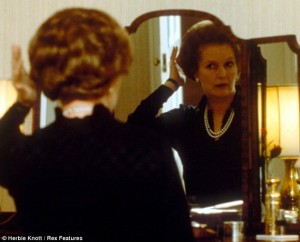 I also find it fascinating that Moore confirms what I had long heard from other sources, which is that Thatcher was widely thought to be a very attractive woman. To be sure, her photographs give no clue to the nature of her allure, at least from the point of view of an American eye, but one cannot doubt that many men—not all of whom were disposed to like her—were susceptible to her feminine charms. Indeed, the following footnote, which is characteristic of Moore’s poker-faced sense of humor and which I quote in its entirety, made me laugh out loud:
I also find it fascinating that Moore confirms what I had long heard from other sources, which is that Thatcher was widely thought to be a very attractive woman. To be sure, her photographs give no clue to the nature of her allure, at least from the point of view of an American eye, but one cannot doubt that many men—not all of whom were disposed to like her—were susceptible to her feminine charms. Indeed, the following footnote, which is characteristic of Moore’s poker-faced sense of humor and which I quote in its entirety, made me laugh out loud:
 I went to see the
I went to see the 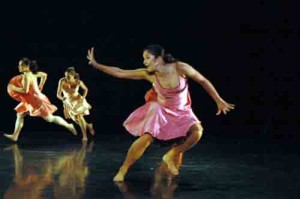 I’ve loved Esplanade, in which Taylor blends walking, running, hopping, sliding, and the music of Bach into a plotless explosion of pure choreographic delight, ever since I first started looking at the dance three decades ago. Arlene Croce called it “a classic of American dance” when she
I’ve loved Esplanade, in which Taylor blends walking, running, hopping, sliding, and the music of Bach into a plotless explosion of pure choreographic delight, ever since I first started looking at the dance three decades ago. Arlene Croce called it “a classic of American dance” when she 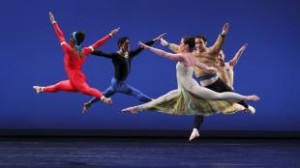 Orbs is a somewhat tougher nut to crack, but only because of its greater length and the more difficult music to which it is set, which includes Beethoven’s Grosse Fuge and the whole of his B Flat Quartet, Op. 130. The dance itself is so immediately accessible that Croce felt moved to describe it as “perhaps the most charming work in the modern dance repertory.” I don’t know whether I’d go that far, but I can’t imagine anyone finding it hard to enjoy. The décor is by Alex Katz, the most deservedly popular of modern painters—Taylor, with whom he collaborated on several occasions, was very much a part of Manhattan’s avant-garde visual-arts scene back in the Sixties—and the “plot,” if you want to call it that, is wonderfully fanciful.
Orbs is a somewhat tougher nut to crack, but only because of its greater length and the more difficult music to which it is set, which includes Beethoven’s Grosse Fuge and the whole of his B Flat Quartet, Op. 130. The dance itself is so immediately accessible that Croce felt moved to describe it as “perhaps the most charming work in the modern dance repertory.” I don’t know whether I’d go that far, but I can’t imagine anyone finding it hard to enjoy. The décor is by Alex Katz, the most deservedly popular of modern painters—Taylor, with whom he collaborated on several occasions, was very much a part of Manhattan’s avant-garde visual-arts scene back in the Sixties—and the “plot,” if you want to call it that, is wonderfully fanciful. Part of the charm of Orbs is that these delicious occurrences are accompanied by the most monumentally profound music that Beethoven ever wrote. The incongruity of the juxtaposition is occasionally startling, even jolting, yet you never feel that Taylor is having fun at Beethoven’s expense: he is simply showing you what he hears in the music. In Private Domain, his 1987 autobiography, he remarked that “the two-and-two-thirds of Beethoven’s last quartets that I pick might have been less intimidating had I realized how revered they are.” Take a close look at the unexpected swerve in the middle of that sentence and you’ll come away with a clue to the paradoxical way in which his creative mind works.
Part of the charm of Orbs is that these delicious occurrences are accompanied by the most monumentally profound music that Beethoven ever wrote. The incongruity of the juxtaposition is occasionally startling, even jolting, yet you never feel that Taylor is having fun at Beethoven’s expense: he is simply showing you what he hears in the music. In Private Domain, his 1987 autobiography, he remarked that “the two-and-two-thirds of Beethoven’s last quartets that I pick might have been less intimidating had I realized how revered they are.” Take a close look at the unexpected swerve in the middle of that sentence and you’ll come away with a clue to the paradoxical way in which his creative mind works.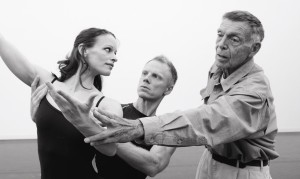 As Hilary and I left the theater, I remembered something that Taylor once told me when I asked whether he thought his dances would survive him. “I don’t know if they’ll last,” he said. “I try to make them to last. They’re not made to be seen one time.” I suppose I’ve seen Esplanade fifteen or twenty times, never without finding new things at which to marvel. I doubt I’ll be so lucky with Orbs, since it isn’t performed very often and I’m not nearly so young as I was when I first discovered Taylor. It’s quite possible, in fact, that I’ll never see it again, just as I’ll almost certainly never return to the exquisitely beautiful
As Hilary and I left the theater, I remembered something that Taylor once told me when I asked whether he thought his dances would survive him. “I don’t know if they’ll last,” he said. “I try to make them to last. They’re not made to be seen one time.” I suppose I’ve seen Esplanade fifteen or twenty times, never without finding new things at which to marvel. I doubt I’ll be so lucky with Orbs, since it isn’t performed very often and I’m not nearly so young as I was when I first discovered Taylor. It’s quite possible, in fact, that I’ll never see it again, just as I’ll almost certainly never return to the exquisitely beautiful